I Am Water: learning to free-dive in Petit St Vincent
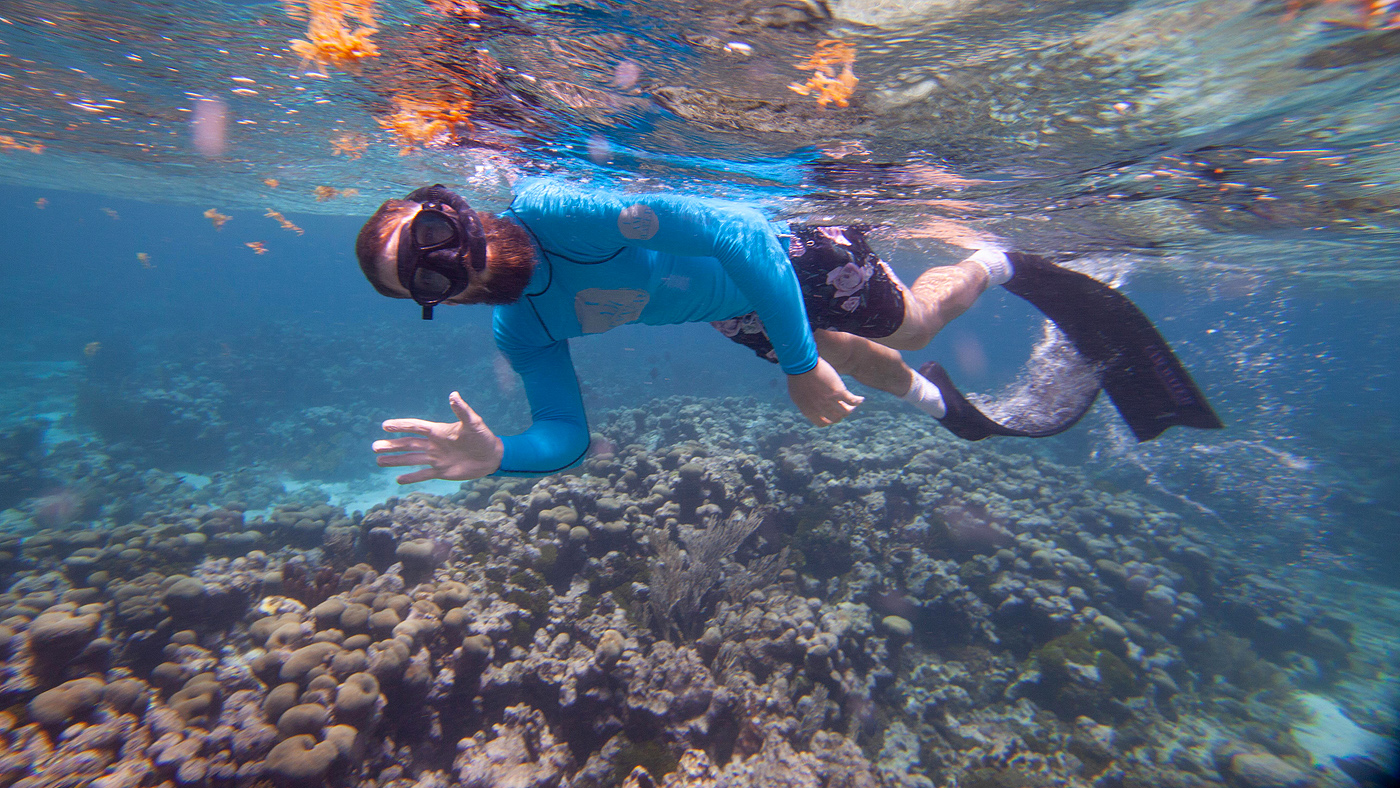
A free daily email with the biggest news stories of the day – and the best features from TheWeek.com
You are now subscribed
Your newsletter sign-up was successful
It is early evening one recent Wednesday on the Caribbean island of Petit St Vincent and we’re sitting on a deck beneath the bleeding sun discussing the concept of “relaxing into discomfort”. It is not an obvious topic. For most visitors to Petit St Vincent, relaxing into near-total comfort is very much the order of the day.
Petit St Vincent, or PSV to its locals, is one of the most luxurious resorts in the world: a private island in the Grenadines island chain in the Lower Antilles, where the colour palette is strictly that of a child’s felt-tip drawing. Guests occupy one of 22 secluded villas (humbly referred to as cottages), each with an uninterrupted view of the pristine turquoise ocean.
Some residences have their own beach, and none are more than a few yards from the two miles of golden sand that ring the island. There is a treetop spa, two high-end restaurants and a lavishly stocked cellar. Staff outnumber guests at a ratio of three-to-one.
The Week
Escape your echo chamber. Get the facts behind the news, plus analysis from multiple perspectives.

Sign up for The Week's Free Newsletters
From our morning news briefing to a weekly Good News Newsletter, get the best of The Week delivered directly to your inbox.
From our morning news briefing to a weekly Good News Newsletter, get the best of The Week delivered directly to your inbox.
The resort makes a feature of its lack of connectivity. There are no TVs, while wifi is only available in a few spots. However, running a yellow flag up the pole outside your cottage will have one of the army of servers at your door, carrying food, drink or whatever else takes your fancy. Hoist the red flag for privacy, and you’re master of your own domain.
In addition to living the life of a decadent billionaire, the other purpose of our trip to PSV is to learn how to free-dive — i.e. to plunge amid the rich treasures of the Caribbean without the assistance of scuba gear.
“Relaxing into discomfort is a crucial part of free-diving,” says Peter Marshall, a former US Olympic swimmer, who is one half of the team charged with transforming six landlubber visitors into ocean explorers. And then to bring them all home again in one piece.
I Am Water
A free daily email with the biggest news stories of the day – and the best features from TheWeek.com
Marshall’s partner is Hanli Prinsloo, a South African former professional free-diver, who can dive unaided to depths of more than 60 metres and stay submerged for around six minutes. Prinsloo is as close as this world has to a mermaid: she is an astonishingly graceful presence underwater and has swum up close with almost all of the ocean’s most magnificent creatures. Marshall has taken dazzling photos of Prinsloo drifting alongside enormous manta rays, gambolling with cetaceans and hanging out with hammerheads. A pod of pilot whales once trusted her as one of their own and recruited her as a babysitter to mind their nursery of infants.
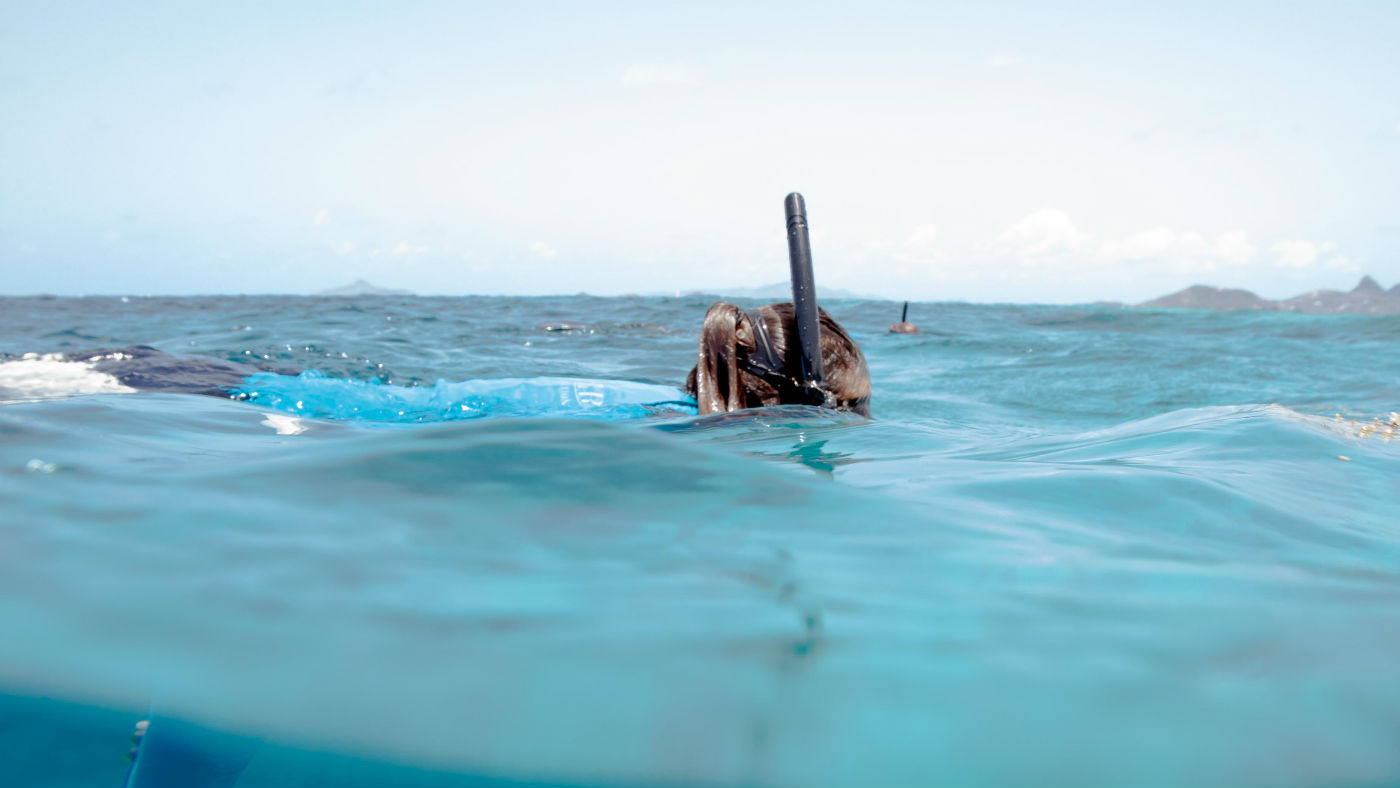
Together, Prinsloo and Marshall run two closely linked organisations: I Am Water Ocean Conservation, which is a non-profit focused on working with underprivileged coastal communities, and I Am Water Ocean Travel, which arranges “transformative ocean experiences” in the luxury travel sector. The arrangement between the two means that people paying for bespoke trips to swim with dolphins in Mozambique, for example, or maybe to dive with humpbacks in Niue or whale sharks in Madagascar are helping finance education programs for the two thirds of disadvantaged children in South Africa who cannot swim despite living in walking distance of the sea.
The guiding ethos is that you protect what you love, and I Am Water plays persuasive matchmaker between human and the ocean. Both Prinsloo and Marshall have encyclopaedic knowledge of all underwater life, and are committed to its preservation amid the well-publicised issues of over-fishing, climate change and pollution, and the disruption to fragile ecosystems that all are known to hasten. A few hours listening to tales of the deep can offer a convincing enough education, but when coupled with first-hand experience of the marine wonderland, the pair can create disciples (and donors) for life.
PSV itself is now part of the process, and the collaboration with I Am Water is part of the resort's commitment to help stop whale hunting in the Caribbean.
Take a breath
Getting to Petit St Vincent requires a flight to Barbados, then a one-hour hop in a tiny propeller plane to Union Island, followed by a 20-minute boat transfer. PSV is the most southerly island among the 32 that comprise the country of Saint Vincent & the Grenadines and it is a short paddle from waters officially belonging to Grenada.
Guests arriving to the island are greeted at the dock with a cold towel and a pina collada — each as welcome as the other after a 12-hour journey — before being transferred via mini-moke to their cottages. We took dinner on our first evening in the beach restaurant, where the only prohibition to drinking the night away on cocktails mixed beneath the moon was the promise of yoga at 7am and an introduction to the techniques that would keep us alive for the rest of the week.
We duly arrive to the beachside yoga pavilion shortly after sunrise the next morning and find a mask, snorkel and diving T-shirt on our mats with Prinsloo ready to begin our rapid immersion into her world. We learn yoga stretches that are common among both free-divers and opera singers: extending the muscles that surround lungs and diaphragm. We learn how to compartmentalise the areas in which we are storing our air: inflating the lower part of our lungs by pushing our bellies out, then filling our chests and eventually our necks and even our cheeks.
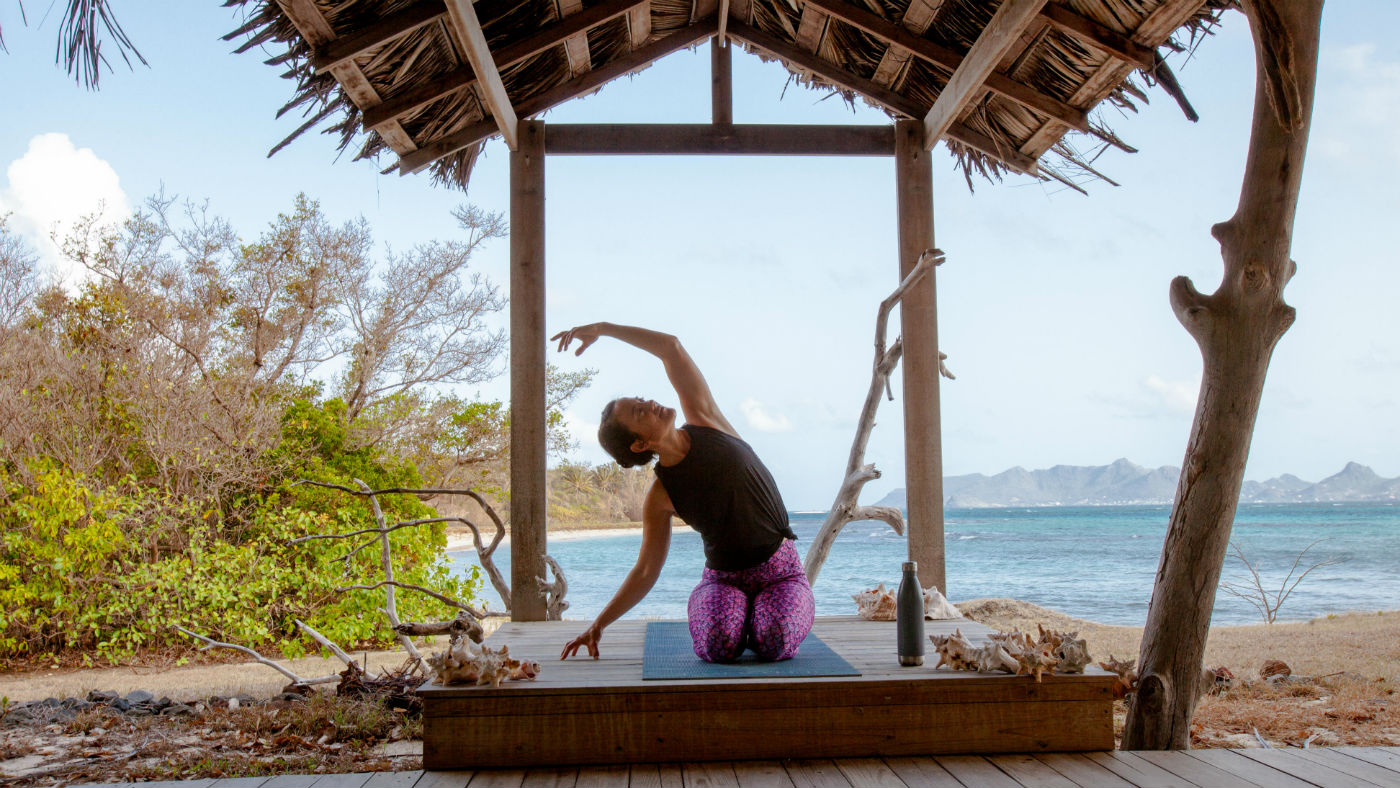
More significantly, we also learn how to train our brains to reassure uncertain bodies that there is no reason to panic. There is always more oxygen inside than we might think and many of the exercises are designed as conscious overrides to our in-built early-warning systems. We learn to ignore our first trigger to gasp, ride out the contractions in the base of the diaphragm and hold on a few more seconds, even as an amber alert begins to sound.
After only an hour of training, all of us are holding our breath for close to two minutes. And with that, we are ready to take to the seas.
Oh buoy
Petit St Vincent has its own diving centre, established by Jacques Cousteau’s son Jean-Michel and still bearing the family name. It is close to one of the world’s Marine Protected Areas, essentially the underwater equivalent of a National Park, where the environment is closely monitored and wildlife can thrive. We are kitted with fins and then we borrow one of the diving centre’s boats and a captain to head out to an area of quiet ocean to take the plunge for the first time.
The basics of free-diving — hold your breath and head downward — have been practised for centuries among the subsistence fishermen of any number of ocean-dependent civilisations. Latterly it became a competitive sport, with new marks regularly being set for depth and duration, expanding even medical understanding of the limits of the human body. For us, at least at the start, few world records are being challenged. Instead, we require a weight attached by rope to a buoy floating on the surface and the encouragement of Prinsloo and Marshall to haul ourselves down, hand-over-hand, head first.
The water is a gloriously comfortable 28 degrees, but our first diving attempts are inevitably tentative. But confidence soon builds under the calming supervision of our expert guides and we learn how to duck-dive to start the downward propulsion more effectively, as well as how to “equalise” our ears to cope with the change in pressure of deeper water. Through several sessions over the coming few days, we are given a thorough briefing in rescue techniques should anyone get into danger, underpinned by lessons in free-diving theory and its history. We visit reefs and coves, where we are buddied up with a fellow novice and set free to investigate as deeply and as closely as we dare.
Finding Nemo
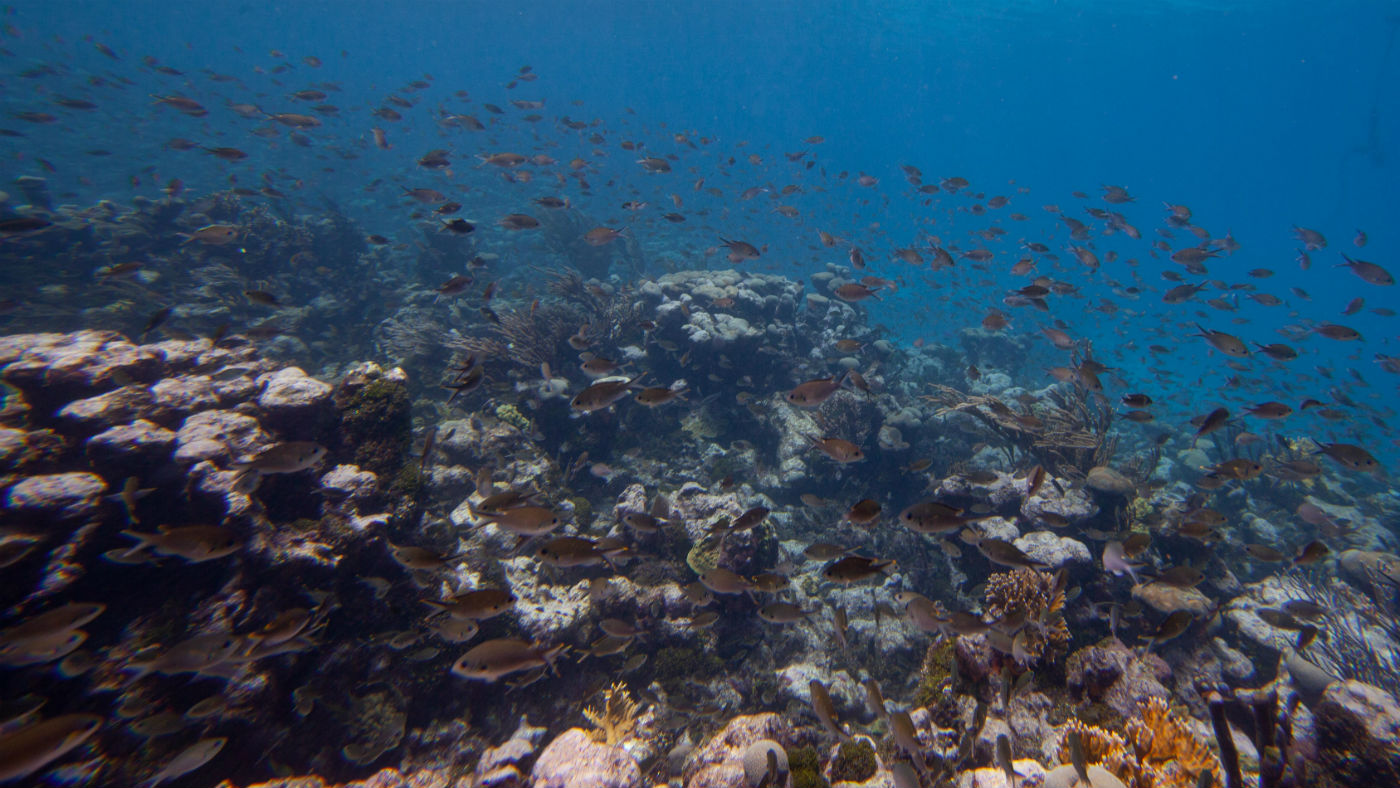
For anyone who has either snorkelled or scuba dived — or even watched a nature documentary on television — the wonders of underwater exploration are superbly apparent. The unique liberty afforded a free-diver is to be unencumbered by any equipment: there are no bubbles from tanks nor the noise of machinery. The sounds of the ocean — reef crackles, in particular — thus add a hypnotic sound-scape to the awesome visuals.
On our first dive we see a couple of nurse sharks and a spectacular spotted eagle ray, and are reliably surrounded by the shoals of brightly coloured fishes that transport us to the middle of a Pixar movie. I find myself taking my responsibilities as a diving buddy incredibly seriously, watching hawk-like as my partner goes in search of sub-aquatic escapades, before it’s his turn to hover at the surface and regain his breath as my nervous dives become gradually longer and more adventurous.
Our diving skills grow stronger through our sessions in the water, which are punctuated by yoga and massages back on dry land, as well as fine dining and endlessly fascinating conversation with Prinsloo and Marshall. On our final day, we take PSV’s sloop “Beauty” on a 90-minute voyage towards Tobago Cays, the smallest inhabited island in the Grenadines, where we’ve been told that “If you don’t see turtles, you aren’t looking.” Thus tempted, we all look intently.
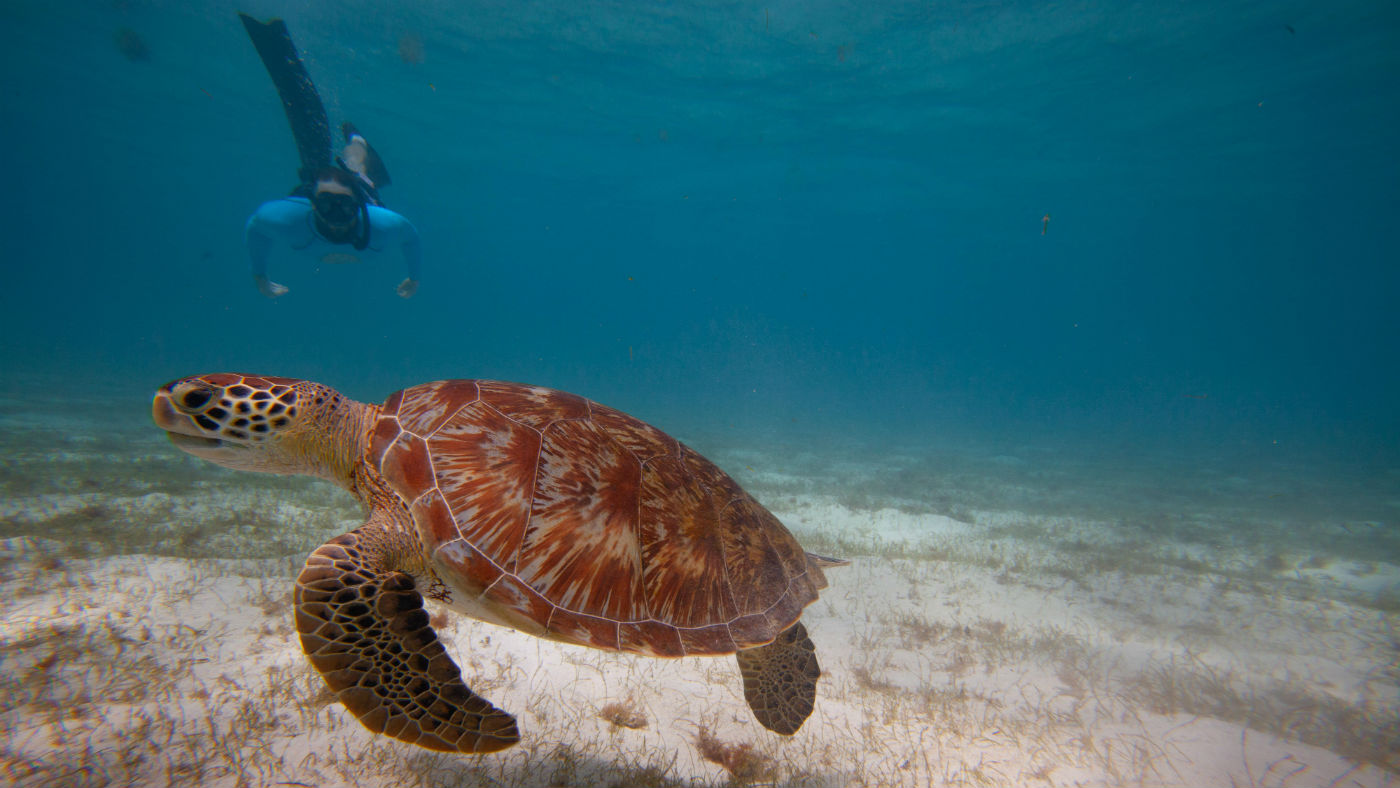
Sure enough, one green sea turtle lopes into view. And then there’s another one. Within a few minutes, there are turtles in all directions, drifting through the water, rising for breath then diving to the bottom, describing the course of a slow-moving roller-coaster.
Though the waters around PSV don’t boast many of the particularly large underwater creatures that most fascinate Prinsloo and Marshall, the turtles prove utterly hypnotic to our group and we quickly become transfixed. A sensation of belonging somehow sets in and, without really noticing, we also suddenly discover that free-diving is the easiest thing in the world. We abandon any lingering apprehension to turn the turtles into our new dive buddies as they lead us across a starfish-dappled ocean floor.
Memories
Marshall is a superlative underwater photographer and Prinsloo carries a high resolution GoPro on the majority of her long and effortless dives. It means that when we convene for an emotional breakfast on our final morning, we’re able to view hundreds of pictures and videos of our adventures. The images of us nervously inching down the rope from the buoy seem like they come from a different era. We’re all captured waving as we swim alongside the turtles, without a care in the world, and are all convinced that they were waving back.
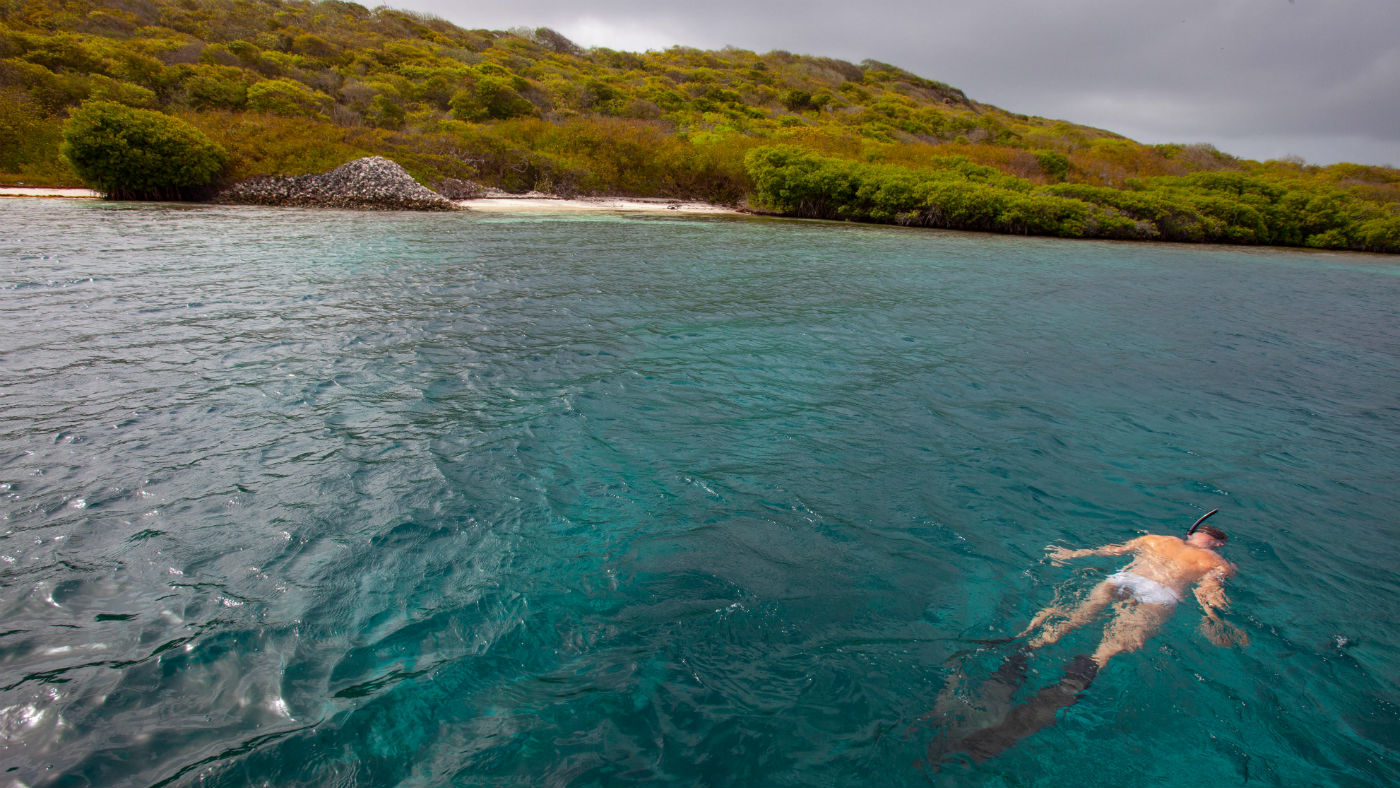
Petit St Vincent itself is a splendid oasis for any kind of Caribbean vacation, on land or sea. Its remoteness and seclusion is particularly valued by honeymooners, and there are hammocks and loungers scattered at comfortable intervals around most of the otherwise deserted beaches. The flag system works here too: guests can request food and drink service to their lounger-side throughout the day.
For the more adventurous, there are trails that run over the island’s solitary uninhabited hill, and an outdoor gym in a small woodland clearing, where your only company are the skittering land crabs that appear from small holes in the sand. Bikes are freely available to get around the island, though nothing is further than a 10 minute stroll. The sloop can be commissioned for sunset cruises and her crew will cook you a barbeque on board before retreating beneath deck should you wish to enjoy the view across the Caribbean alone.
During idle musings one might dream one day of owning an island. Or maybe, like Homer Simpson, of living beneath the sea. A week free-diving in Petit St Vincent is like a test run for both, with the only regret that one can never quite master the art of growing gills forcing a reluctant return to the surface and the realities of life on land.
Rates at Petit St. Vincent start from $1,200 (£870) per room per night, based on two sharing a one bedroom cottage in low season. Includes three meals daily, all non-alcoholic beverages, the use of non-motorized water sports and all facilities at the resort. For further information, visit petitstvincent.com | +1 (954) 963 7401
The collaboration with I AM WATER is part of Petit St Vincent’s commitment to help stop whale hunting in the Caribbean. For more information visit iamwaterfoundation.org or iamwateroceantravel.com.
All diving photographs, including top image, © Peter Marshall.
-
 The ‘ravenous’ demand for Cornish minerals
The ‘ravenous’ demand for Cornish mineralsUnder the Radar Growing need for critical minerals to power tech has intensified ‘appetite’ for lithium, which could be a ‘huge boon’ for local economy
-
 Why are election experts taking Trump’s midterm threats seriously?
Why are election experts taking Trump’s midterm threats seriously?IN THE SPOTLIGHT As the president muses about polling place deployments and a centralized electoral system aimed at one-party control, lawmakers are taking this administration at its word
-
 ‘Restaurateurs have become millionaires’
‘Restaurateurs have become millionaires’Instant Opinion Opinion, comment and editorials of the day